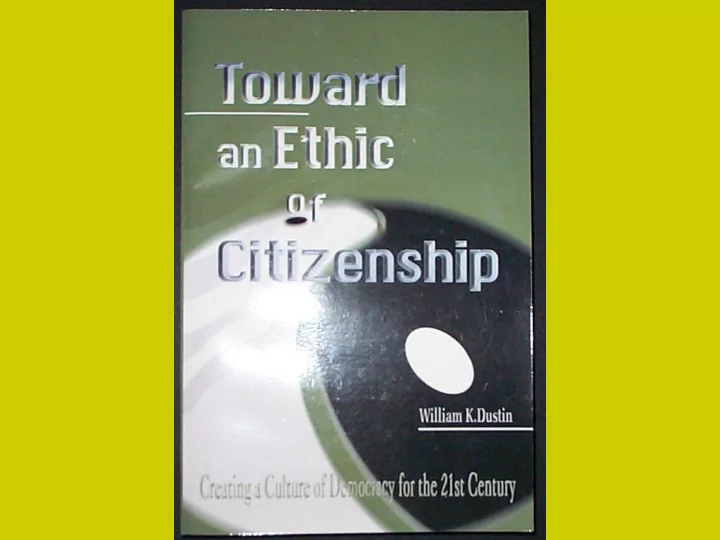

Democracy is everywhere; democracy is nowhere. Virtually every nation on the face of the earth today claims to be a democracy. Yet democracy - a government of the people, by the people, and for the people - has never been achieved except in some of the pre-literate societies. The dilemma of democracy is that it is universally proclaimed, yet its ideals are universally rejected in practice. However those ideals are aspired to and derive from ideas that have a long tradition in western civilization. Citizenship is the companion of democracy. Without citizenship there can be no democracy, and it is through the development of citizenship that democracy becomes possible.
Citizenship That secular ethic that defines membership and participation in the political community and provides the cooperative context within which political competition takes place.
Citizenship Model Alternative Futures Globalization, Bio-ethnic Regionalism World Citizenship Individual Rights Citizenship Obligations Community Remedies Sanctions Culture History Greek City States, Roman Empire, Medieval Europe, Revolution
Basic Dimensions in the Model • Homeostatic Dimension Mediates the tension between the individual and community • Hermeneutic Dimension Interprets the culture history of our past into the present as we create our future
Individual Citizenship Role Functioning Status Internalized Ethic (Passive) (Active) Role Development Remedies Sanctions Citizenship Citizenship Rights Obligations Individual Community Orientation Orientation
Collective Citizenship Outer normative membrane Political (citizenship Public Space minimum). This with defines citizenship Public in terms of Institutions inclusion and exclusion. Inner normative Political membrane Private (citizenship Space frontier). This with Private defines citizenship Institutions in terms of public participation . Public Private Linkage
The Citizenship Minimum • The Moral Minima • The Cultural Minima • The Social Minima
The Citizenship Frontier • Permeability • Optimum Balance • Separation of Public and Private
Internal Parasitism
External Parasitism Alien Organization Parasitized Internal Public Organization
Ethical Structure of Democratic Citizenship
Evolution of Representation and Property Evolution of Representation Privilege Property People Evolution of Property Land Capital Money
The Citizenship Frontier as Representational Interface Citizenship Frontier (Interface of Representation) Re.present Rep.resent (Ideas) (Citizens)
Types of Representation • Legislative Representation • Executive Representation • Judicial Representation
The Myth of Election • The Ecological Synergy of Electoral Pathology • The Inherent Corruptibility of Election • Responsibility Avoidance • Election Places Demands on Legislators Unrelated to Governing • Election Results in the Professionalization of Politics • Election is Noisy • Election Results in Unfulfilled Promises • Tendency for Representation to Become Advocacy
• Election Emphasizes Accountability, not Political Responsibility and Representation • Election Does not Select the Best • Election often Produces Misrepresentation, not Representation • Election Results in Loss of Privacy • Election Results in Hubris • Election Emphasizes the Cult of Personality Instead of the Merit of Ideas • Election Results in the Political Manipulation of Citizenship
Advantages of Random Selection • Maximizes Liberty • Integrative Effects • Will Replace the Cult of Personality with Representational Authority • Long Range View
• Representation of all Personality Types • Reduce the Complexity of Government and Strengthen Local Political Communities • Free Up Resources Used in Election for Use Elsewhere in the Economy • Minimizes the Tyranny of the Majority and the Evils of Faction
Education - The Template of Citizenship The Political Product – Representation (What Type of Society Do We Want to Live In?) Responsibility Education Reason Individual Community (Interests ) (Rights) (Representation) Law, Culture, History Human Rights
The Transition Party A temporary party the sole purpose of which is to amend the Minnesota Constitution
Proposed Minnesota Constitutional Amendment • Legislators chosen by lot from the legislative districts within which they reside • Constitutional officers chosen by the electors of the state • Electors of the state chosen by lot from the legislative districts within which they reside
• Judges appointed by the Governor for a term of ten years – appellate court and supreme court judges require legislative approval • An article pertaining to citizenship and representation is added • The Secretary of State becomes a special office because it has jurisdiction over the random selection process for legislators and electors
Conclusion To be Citizens , or not to be. That is the question.
Ethic of Citizenship Yin Yang Rights Responsibility Individual Community Public Private Competition Cooperation Theory Practice Children’s Rights Parents’ Rights Specialist Generalist Unity Diversity Right Click to End Preview
Recommend
More recommend